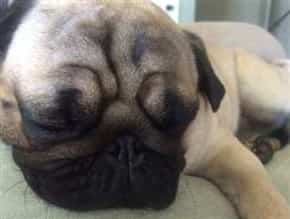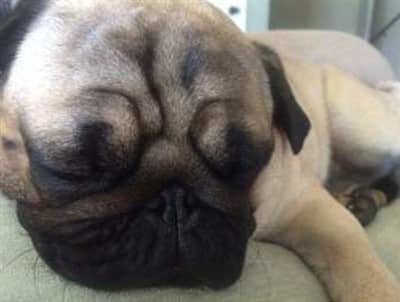Pug Sleeping Habits
Overview
Just about any Pug owner will agree that this breed gets a bit of a bad rep in regard to sleep. The Pug is sometimes thought of as a lazy breed; a dog that takes over your favorite chair and sleeps his life away, snoring as if he doesn't have a care in the world.
While it may be true that a Pug
does tend to snore - and make a few other interesting noises - he does not sleep more than any other breed and he is not lazy at all. In fact, Pugs are super animated, very personable and eager canines that often are curious, emotional and expressive.
They thrive on attention and tend to mimic their owner's mood and vibes. If you sleep a lot, your Pug is not going to pace around the room; he'll be right by your side. And if you're active, he'll want to be right there as well; in fact many Pugs need to have limitations set because they'll push themselves to far and can have overheating and breathing issues.
One element that may make it seem as if a Pug sleeps a lot is that he is so obvious when he does it. Other dogs may retreat quietly away and an hour later, an owner may wonder 'where's my dog?' while the Pug won't be shy about snuggling right up to you or taking over your spot on the sofa to spread out and snooze.
In this section we are going to cover:
- How much Pug puppies should sleep
- Normal amounts of sleep for adults and seniors
- Reasons why a Pug may have trouble sleeping
- Things that may cause a Pug to sleep too much
- Common questions about Pug sleeping habits
Please note:
PetPugDog is reader-supported, and some of the product suggestions on this page may be affiliate links. As an Amazon Associate we earn from qualifying purchases. This is at no extra cost to you and helps keep this site running.
Emma, 20 months old, photo courtesy of Helen Gastaldo
How Much Sleep is Normal for Pugs
Newborns -
Newborn Pug puppies - from 1 day old to 3 weeks - sleep just about all of the time, up to 22 hours per day. They will mainly only be awake to eat; after that's it's right back to bed, warm and safe next to the dam and littermates.
The age of 3 weeks old is a huge turning point; at this time both hearing and vision are working well and with this comes a new found curiosity. A heightened interest in exploring his little world and for playing with siblings will cause the pup to stay awake a bit longer now. From 3 weeks to 8 weeks, a puppy will sleep anywhere from 20 to 21 hours per day.
Puppies -
Owners of new puppies often want to know how much Pug puppies
sleep because they worry about the pup being overtired and perhaps sleeping too much and missing out on things. The first couple of months - age 2 months to 5 months - a Pug puppy will sleep from 18 to 20 hours per day. This includes both nighttime sleep and naps taken all throughout the day.
This is a really funny stage, because often a Pug puppy will be so interested in his world that he struggles to stay awake. It's not uncommon for a Pug to zonk out in the middle of playing or even eating, resting his head on the rim of the bowl because he just couldn't make it to his bed.
Each month that the Pug matures, he will sleep a bit less and stay awake for longer periods. By 6 months old, many Pugs are on the sleeping schedule of adults.
Adults -
Adult Pug dogs sleep roughly 14 per day. There are some reasons for sleeping less or more (discussed ahead). This may seem like a lot - especially when compared to how much we get- however most of this will be done at night. When you subtract 8 or 9 hours of nighttime snoozing from the average of 14, this leaves 5 to 6 hours of on-and-off again naps.
The amount of naps will depend on how much the Pug sleeps at night and most will shadow what their owners do. It's very common for this breed to start getting tuckered out when lights are dimmed and their humans are relaxing before bed. It's typical for a Pug to drift off about an hour before his human family; he'll try to hang on but will conk out as the house quiets down and everyone is relaxing.
Then, most will pop right awake as soon as the alarm goes off of if they sense that their human has awoken. It's rare for a Pug to stay sleeping in the morning while everyone starts their day.
Since canines - like us- need a good amount of deep REM sleep, if they do follow their owner's sleep schedule of 8 hours a night, this leaves a good 6 or so hours that will be napped away during the day. And if an owner is only sneaking in 6 or 7 hours with the Pug following suit, this makes for a lot more napping of up to 7 or 8 hours during the day. So, how much you actually see your Pug snoozing will depend a lot of your own schedule and whether or not you are home with your dog or are away at work or school.
Seniors -
As a dog ages, there are many changes… decreased metabolism, a slowing down that reduces activity, etc. and often an extra hour or so of sleep time is needed for the older, senior Pug. These are gradual changes, so you may not notice that your Pug sleeps an extra 20 minutes or so; but as the years pass, this adds up to falling asleep an hour earlier than usual and it is then that it really becomes apparent.
When a Pug Has Trouble Sleeping
With puppies, it can take a while for puppies to accept their schedule; many may seem downright nocturnal, making you wonder if somehow an owl was crossed in the Pug's bloodline. It takes a couple of months for a pup to understand the cues of a day winding down and feeling isolated can cause a puppy to stay awake whining or barking at night.
For those of any age, this breed will show appreciation for many of the care elements you provide and often won't be shy at all to announce when things are not right.
Here are the top reasons why a Pug may not be sleeping as good as usual:
#1: Quality of the bed
- Choosing the right bed for your Pug
is important for this breed that tends to have hips and back issues. it should be appropriately sized and constructed with an orthopedic memory foam base for proper body support.
Keep in mind that beds do not last forever; after 4 years or so, cushions can lose buoyancy and won't be as supportive as they once were. Also, a puppy may be outgrowing his smaller bed and seniors may a thicker mattress to better support aching joints.
If your Pug needs a new bed, you may wish to consider the The Dog's Bed - Premium Memory Foam Bed . This has a base of 2-inch medical-grade memory foam, water-proof inner and outer fabric, and a cover that is resistant to mold and dust mites and washable.
. This has a base of 2-inch medical-grade memory foam, water-proof inner and outer fabric, and a cover that is resistant to mold and dust mites and washable.
#2: Location
- This breed does not like to feel isolated; feeling this way can cause whining and barking at night. Pugs need a good place to rest but still like to be close to the 'action' so that - if they happen to prefer it, they can join in. While it is a good idea to give your Pug his own space - especially if you want him to get used to that area for when home alone - it should in a quiet corner of an familiar room that is used by the family such as the living room or den.
Some owners may move a Pug's sleeping area further away if the dog snores loudly or is otherwise causing a disruption; however, a compromise should be made so that a Pug doesn't feel quarantined. Additionally, any chronic snoring noises
should be evaluate by the vet for possible stenotic nares, elongated palate and other issues common to brachycephalic breeds.
#3: Drafts or temperature changes - What may have been a good sleeping area in the summer
when a Pug needed to be closer to the AC may not be good in the winter
where there may be a draft and vice-versa. Drafts, which can cause interrupted sleep, are common near windows and doors, but can also be found hear exterior walls. Keep in mind that any cold spots may only be near the floor, so you may want to get down to your Pug's level to access things.
#4: Snoring and breathing problems
- One of the most common signs of sleep apnea is snoring, so if your Pug sounds like a tractor while he's catching forty winks, it's a good idea to have this possible health issues checked out. With sleep apnea, a dog will stop breathing for 10 to 20 seconds, repeatedly throughout the night. While some stay asleep, many will gasp and wake up. This can cause sleep deprivation, which often manifests as troubled, moody behavior
the next day.
Reasons a Pug May Sleep Too Much
Dogs will vary the amount of time that they sleep by an hour or so, just like humans. However, whenever there is a marked increase in how much a Pug is sleeping this is reason to take note.
Possible reasons include:
Mimicking-
As we touched on a bit earlier, this breed is notorious for copying his owner. Even if you don't sleep much, if you spend a lot of time watching TV or zoning out with video games, etc. your Pug may take that as a sign that it's time to stop all activity and rest. After all, very few Pugs will run around and stay super active if the owner is plopped on the sofa, aside from young puppies that may have high energy levels.
Lack of Stimulation -
If a dog has nothing better to do, he'll often do one of two things: bark or sleep. This breed often chooses the later and you really can't blame him. Dogs need interaction, challenges, sights to see and scents to smell!
It's best for a Pug to have a fun session of command training after dinner, be taken for a late evening walk and have some interactional playtime as opposed to just lazing around.
A dog's world is as small or as large as you allow it to be. If a Pug is kept at home without much going on, he's going to sleep more. If he's taken to different places, goes on new walking routes, is challenged by learning new commands, etc. he's going to have a more stimulating existence and therefore sleep only as much as he needs to and no more.
Illness or Injury -
Any time that a dog suddenly sleeps much more than normal, this is a red flag that there may be a medical condition.
For puppies that appear to be suddenly weak and dizzy, this is a possible sign of hypoglycemia, most often seen in those 2 to 5 months old.
With adults, any condition that causes the body to fight off disease or caused discomfort will make a dog sleep more.
If you notice that your Pug is sleeping much more than usual, you cannot attribute it to any of the issues mentioned above and it lasts for longer than 3 days, this is your signal that it's time for a vet visit, even if there are no other symptoms.
Quick Q&A - Pug Sleep Questions from Readers
Q: Has it been proven that dogs do or do not dream?
I'd swear my Pug does dream, he moves around and even seems to mumble. His eyes move around under his lids too when he's asleep.
A:
Yes, absolutely. Studies have proven that dogs do dream
and quite often. They have eye twitching, lip movements and even vocalizations that you wrote about that point to REM sleep. REM sleep is the phase of deep sleep when dreams occur.
It is believed that dogs and other animals can have complex dreams full of memories of actual events. So that's pretty cool; our Pugs are most likely having dreams about us.
Q: Should my Pug sleep in my bed?
Aside from hogging the mattress is there anything wrong with it? Would it be interpreted as spoiling?
A:
While you'll want to hold off until your Pug is housebroken, there's nothing inherently wrong with a Pug sleeping in his owner's bed. There are some cons, however. Due to heavy shedding you'll have to be prepared for how much fur may end up on your sheets, blankets and pillows. Also, know that once your Pug is allowed to sleep in your bed, that spot is claimed. Claimed. For. Life. Also, if an owner is currently single, some thought should go into the future when someone else may want the other side of the bed.
The only time we don’t recommend this is if a dog really has trouble with listening and is in need of training to learn hierarchy (Alpha leader, Beta follower) or if a senior Pug is in need of a quality orthopedic bed.
Q: Is it okay for Pugs to sleep on their backs?
My Pug will fall asleep, belly up, and his paws up in the air. It's pretty comical but I'm wondering if this can cause breathing problems or anything else?
A:
While this is not the 'normal' canine way of lying down to sleep, a small percentage of dogs do sleep this way. If your Pug finds that sleeping on his back is the optimal position for him (and he must if he's doing it), this might actually be his way of breathing better at night. When curled up, this constricts the neck and makes breathing a bit more difficult. But if a Pug naturally lies on his back, neck extended back, this will open up the windpipe and may offer him better airflow though the nasal passages.
Q: Is it normal for a Pug to sleep with his mouth open?
My Pug does this and kind of drools while he's sleeping.
A:
Being a brachycephalic breed, Pugs are prone to stenotic nares, which essentially means narrowed nostrils. This can make it hard for a Pug to breathe correctly out of his nose. If you notice that your Pug has noisy breathing while exercising, snores a lot and/ or coughs, gags or vomits after eating or things like this are worse during hot, humid weather, you'll want to have him checked for this.
Excessive drooling
while sleeping is a possible sign of sleep apnea. And snoring is a sign as well.
But, with that said, if your Pug seems fine otherwise and the drooling is not too bad, it's nothing to be concerned with. You will want to wipe the chin area each morning and then dry it well since damp fur - over time - can lead to skin yeast infections and/or discoloration of the fur.
Did you find this article helpful?
If so, you'll love The GIANT Book of Pug Care
(available in both hard copy and eBook).
You may also like:
Pug Dog Separation Anxiety
- Effective ways to help your Pug cope when home alone, whether you are gone for just a couple of hours or for the day.
Pug Paw Care
- The paws are an often overlooked area of the body, but one that should not be ignored. Read tips to keep your Pug's paws in good shape and help for treatment of common paw issues.



